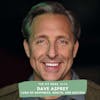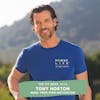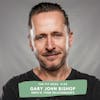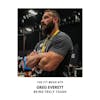Neuroscience Meets Nutrition: Hacking Your Brain's Reward System for Better Habits with Rebecca Washuta

Are you tired of falling for diet myths and struggling in your relationship with food? We sat down with licensed dietitian and health coach Rebecca Washuta, who specializes in weight loss and autoimmune conditions, to reveal the truth about nutrition...
Are you tired of falling for diet myths and struggling in your relationship with food? We sat down with licensed dietitian and health coach Rebecca Washuta, who specializes in weight loss and autoimmune conditions, to reveal the truth about nutrition and the power of a personalized approach. Through this conversation, we dive into the world of neuroscience and nutrition, providing you with strategies to hack your brain's reward system and reshape your eating habits.
Topics Discussed:
- Importance of working with licensed nutrition and health coaches
- Debunking the myths surrounding diet fads
- Creating balanced meals for sustainable results
- Understanding the role of hormones and blood sugar in physical fitness
- Harnessing the power of dopamine and the brain's reward system
- Identifying triggers and cues for unhealthy habits
- Practicing mindfulness and self-awareness
- Experimenting with strategies to develop sustainable habits
- The significance of embracing a holistic approach to well-being
----
GUEST WEBSITE:
https://www.happyhealthynutritionist.com/
----
MORE FROM THE FIT MESS:
Get bonus clips and additional resources in our newsletter!
Connect with us on Twitter, Instagram, Facebook, and Tiktok
Subscribe to The Fit Mess on Youtube
Join our community in the Fit Mess Facebook group
----
LINKS TO OUR PARTNERS:
-
Explore the many benefits of cold therapy for your body with Nurecover
-
Muse's Brain Sensing Headbands Improve Your Meditation Practice.
-
Get a Free One Year Supply of AG1 Vitamin D3+K2, 5 Travel Packs
-
You Need a Budget helps you quickly get out of debt, and save money faster!
-
Use Vibrant Blue Oils to improve the flow of energy through your body.
[00:00:00] How much do you weigh? Okay. The answer to that question is probably none of my fucking business.
But how you feel about the answer to that question probably has a lot more to do with what you're eating than anything else you're doing to manage your weight.
And why you're eating the way you are. Can be directly connected to your habits.
In this episode, we'll discover some surprising connections between neuroscience and nutrition. And you'll learn how you can hack your brain's reward system to optimize your habits and reshape your relationship with food.
Hey, thanks so much for listening to this episode, Zach is going to join us in just a few minutes. He's not available right now, so he will join us for the interview in just a moment. But first I want [00:01:00] to start by talking with you about diets.
. I've tried them all. Quito. South beach. Low carbs, low carb, low fat. Intermittent fasting. All of them. I've done all of it. Some of it's worked for a little while. Some of it's not worked at all. A lot of it's been a huge pain in my ass.
But here's the trick.
There is no one diet that will work for everybody. At one point, I was a much heavier guy than I am. Now, when you look at the scale, there was 70 more pounds on me than there is at any given time. When I look these days.
And most of that weight came off. When I made some big changes, including cutting out a lot of carbs. I quit drinking alcohol,
which spoiler alert was probably the biggest factor in my weight loss of anything that I tried, but along the way, Eating a little bit better. Drinking. Not at all. inspired me to start moving more. I started riding a bike to work every day. That wasn't enough. I started going to the [00:02:00] gym every day. I started just stacking these little things on top of each other that helped me melt off again, like 70 pounds.
I had people ask me, what are you doing? How is this working for you? This is incredible. I can't believe the transformation. And when I told them what I did, they tried it. I don't know how severely they tried it. I don't know how far in they went. Or maybe they just dabbled for a few days and gave up.
But I don't think I know anybody who had the same level of success in big air quotes with weight loss that I had based on what I did. And that's because nutrition is so specific to each person.
And full disclosure, you know, that weight that I lost, wasn't all that I've had to lose. I still have weight to lose now to get to where I want to be. And when I say weight loss, I don't mean a number on the scale. I mean, Looking the way I want to look feeling the way I want to feel in my clothes. Having a level of confidence that I think comes with a body that I build through intention and through discipline, that is a symbol of the hard work that I've put in to [00:03:00] me. That's when I talk about weight loss, that's what I'm talking about for me is I want to get to a point where physically I am fit for whatever task is at hand and that I don't feel shame.
You know, when I'm at the pool with my shirt off or whatever these are, these are the things that I wrestle with. .
So I've been experimenting lately with my own diet. I'm taking advice from a lot of different experts that I trust and basically trying to make sure that I get enough protein, trying to get the right amount of good fats and trying to get enough vegetables into my. PI whole every day.
And one of the keys to that is measuring it. I know that if I don't measure it, I estimate in my head sorta kinda and feel like maybe I could maybe have a little bit more. You know, dessert after dinner or a little bit extra popcorn with the movie that night. And when I'm not tracking that I know I'm going over because when I do track it, the evidence is there. I can see when I would otherwise make decisions .
To keep eating when I don't need to. And now that I'm tracking it, It's making a huge difference in the way that I feel every day it's making me have enough energy to go to the gym in the morning. I don't feel [00:04:00] groggy. I don't feel the food hangover from eating too late or too much the night before.
But when I get to the gym, the next morning, I have the fuel to push a little bit harder because I'm also tracking that I'm tracking. How much am I lifting every time I lift something? Can I lift a little bit more of this, this time than I did last time? What do I need to maybe back off on today?
Because it just don't have it in me. Maybe I'm a little too sore to lift as much as I did last time. All of these things come back to, for me measuring it. If I don't measure it, then I'm guessing. And I know that when I'm guessing it's based on a lot of emotion and the emotion is almost always wrong.
So I'm trying more and more to rely on data.
To make the kinds of choices that will lead to the kinds of habits that will lead to the kind of lifestyle that I'm trying to live.
So having shared all that, I also want to share that I am no nutritionist. I am no expert. I am no licensed dietician. I would not necessarily take my advice about what you should eat, what you should feel your body with, because again, we're all different, but that's why today we have an expert that [00:05:00] can help you make the right kinds of choices, or at least know where to turn. So you can find the right answers to the questions you have. That's coming up in just a minute.
All right. Our guest is Rebecca . She is a licensed dietician and health coach specializing in weight loss and auto-immune conditions. And we started really looking at diets. What are they do any of them really work?
Interview-Rebecca Washuta - USB: I think it depends on who you ask, and I think to the large majority of the population, diet has a really negative connotation, right?
People associate diet with restriction [00:06:00] diet with , not being able to eat their favorite foods diet with only eating salads or, you know, on the flip side, the keto diet, right? Where you're only eating meat and cheese. , but really in general, diet just encompasses. Everything that you're putting in your body.
And so I do think it's important to take away that negative connotation because it doesn't have to be restrictive.
Jeremy: So how do we fix that? Because for so many people, I mean this is, this is a, an epidemic for. Millions and it just, it just seems so simple. It's the food we put in our face. Why is it such a big challenge for us to solve this problem?
Interview-Rebecca Washuta - USB: It's such a big challenge because there's no one perfect diet, ? It's been shown throughout the research that you can lose weight on a very low fat diet, right? Those are like the diets of the nineties that everyone was, was pitching. Fat's bad. Everyone do low fat and you can lose weight that way.
It's very hard because all of your hunger hormones are going to increase, and we're in these environments where we're surrounded and bombarded by food propaganda, so it's very hard to do, but you can do [00:07:00] it that way. On the flip side, on the other side of the spectrum, you can also lose weight on a keto diet, so it, it really depends on your lifestyle and your preferences and your goals.
There's no one perfect diet and I think there's so much misinformation out there and people trying to press upon other people what they think is right for them. , and I always tell my clients, anyone who is trying to give you diet advice without really walking through your medical understanding, your genetics, your microbiome, they don't have your best interest in mind because you really need to know more about a person to understand what diet they will thrive on.
Zach: let's take it back a little bit so you have more than just a couple of certifications in, you know, things around how the human body works and nutrition and things like that. I'd love to hear you talk about like, how you've gotten to the point where you're at. Like what, what have you done along the way to get to where you are now talking about, uh, behavior changes and habit formation and, and the food that we put in our bodies.
Interview-Rebecca Washuta - USB: I went to school, uh, I [00:08:00] went to Tulane University. I majored in neuroscience. Wasn't sure what I wanted to do with it. Um, nutrition definitely wasn't even on my radar. I just knew I was someone who liked science. once I graduated, I moved to Philadelphia.
I worked as a research assistant at University of Pennsylvania. I hopped around a bit more and I wound up in the pharmaceutical industry. So, um, it was really interesting because you do get to see the behind. And the scenes of what's going on with the drugs and everything happening in the clinical trials, you know, before the drugs go to market and are f d a approved?
So it was, it was, it was interesting to me initially and you know, I was 27, I was making a lot of money. I was traveling the country. I had the corporate credit card. I was taking clients out to fancy dinners, but I wasn't happy. Um, so what I thought was my dream job, you know, once I actually got there, I was like, this isn't it.
And the reason for that is because when you get to see the behind the scenes, you see all the drugs that don't work, right? And so for every drug that's approved, there are hundreds that don't work. And there are these people in the clinical trials , Their whole lives depend on these drugs working, and they don't.[00:09:00]
So it's, it's really hard and it's sad to see that for the most part. , it's a lot of failures. And so, you know, I got to the point where I said, I don't wanna be working to just manage and treat disease. I wanna be upstream from that, and I wanna work to promote it and I wanna work. To promote health and prevent disease.
So, um, in my late twenties I went back to grad school for nutrition and I got my master's. I did this while I was working full-time. So it was a hectic two years, but, um, got my master's and then in order to become a dietician, you need to do an internship. So did my internship. I. Passed my board exam, got licensed in the state of Florida where I live.
And um, I knew I wanted to do a private practice, so I knew I wanted to work with people who are, you know, already relatively healthy and help them continue, um, to reach their health goals. I didn't wanna be in a hospital, so, um, I got an office, I decorated it, I was ready to go. And this is like February, 2020.
So, you know, I, I get my first couple clients in the door and then Covid hits and I was like, oh my gosh, what am I gonna do? You [00:10:00] know, I blew up my whole life to go back to school and now I have to break the lease on my office. I can't see clients. , you know what, at the time felt like the worst thing in the world ended up being a blessing in disguise.
Like most people, I was able to pivot Nancy clients virtually. And it was actually really beneficial because initially I intended on, you know, having this office and having this private practice and seeing clients in Miami, which would've been fine cuz it's a very health conscious community down here.
But, um, because I was seeing clients virtually, I was able to see people from all over the country. And because I was doing it via Zoom, um, I could go back to back to back to back. So I saw a lot more clients than I would normally see. And, you know, from working, uh, during that time with all of those clients, I recognize two things.
One, what we talked about earlier, there's no perfect diet, right? You, you people can thrive on a vegan diet. People can thrive on a keto diet. It really depends on, , their lifestyle and background and, and preferences. And the other thing I saw was that information alone isn't enough to change behavior, right?
So I can give you the [00:11:00] world's best meal plan, the best, the world's best exercise regimen, and it means nothing if you're not gonna follow it, right? So I was able to see that the clients who were. Reaching their goals and they were maintaining the results and keeping the weight off. Developed healthy habits.
So what I did, you know, to leverage my background in neuroscience, to really go in, dive into the research, read all the books on habits, and I created my own framework that I now use with clients to develop habits because, Habits will change. Your, not only change your behavior, they'll change your life.
Really, they, they really shape your, your pull life. And I no longer give out meal plans. I tell my clients upfront, I say they're meal, meal plans are worthless because the minute you go on vacation, the minute you, you know, you have a wedding to go to, all bests are off. So, you know, I focus on teaching clients how to eat so they can choose the best foods for themselves in any situation.
And then, Creating those long-term habits so they're able to, , maintain that and, and keep, keep up with that for life.
Jeremy: So I wanted to jump back to the neuroscience part of this because I [00:12:00] think that's fascinating. What have you discovered there that we can hack into to better optimize these, these little habits that we try to change? , it's just so hard to stick to these things when we try to change our lives, and I think a lot of times it's because we just bite off more than we can chew. But what have you discovered through your research in neuroscience that can help us form and keep, maybe more importantly, better habits?
Interview-Rebecca Washuta - USB: , I've learned a lot and I'm, I'm super excited to share it and, and pardon me if I kind of geek out here because neuroscience, you know, is my background and I love this stuff. So I think the problem, , most people have with creating habits is there's this misinformation out there that repetition creates habits.
And it's not true, right? There's this, this random quote that, um, it only takes 30 days to create a habit. And so I think people, you know, start doing something and maybe they do stick it, stick with it for 30 days. And if it doesn't become a habit at that point, they're frustrated, they feel dejected, they have a lot of negative self-talk, and, and they usually throw in the towel.
, so repetition. Is, is meaningless really, when it, when it comes down to it, [00:13:00] um, that's the old school way to do it. And that's, that's bec that's for a lot of reasons. The first is, you know, it depends on what type of habit you're trying to create, right? Because there are different levels. If you're trying to drink a glass of water first thing in the morning when you wake up, that's relatively easy.
You can probably incorporate that into your routine if you do it for 30 days. If you're trying to work out for 45 minutes every morning and you're starting from scratch, That's gonna take a little bit longer. ? there isn't something across the board that have, you know, habits in general only take this much amount of time.
Like there's a, there's a lot of nuance here. , but one of the easiest hacks is that pleasurable feelings, reinforced behavior. And so, like, I'll, I'll go into the, the evolutionary biology of this. Our ancestors found that. Things that made them feel good, also helped them survive, right? So like having sex for creation, friendships, tribes, and protection food.
Food, energy, muscle, right? So our brains have [00:14:00] evolved in a way where pleasurable feelings reinforce behavior. Our brains want to repeat feelings that feel good, things that make us feel good. And so, um, this really all comes down to dopamine. So dopamine is the feel good neurotransmitter most people are familiar with.
And dopamine winds up being like miracle grow for, , the connections between your neurons. So if you feel good when you're doing something, dopamine is gonna strengthen the connection between the synapses and make that behavior easier to repeat. So I'll give you a general example. I'm sure we've all found ourselves walking into the kitchen.
You open up the pantry and you start eating potato chips, right? And then you get halfway through a bag before you even notice. That's a great example of dopamine. And so sometime in the past, You have eaten those potato chips and you have felt really good about it. And so dopamine was released. It strengthened the connection between the neurons that made that behavior happen, and now that beha behavior becomes more automatic, and [00:15:00] so we can leverage this.
For habits that we do want, right? So we wanna be able to break that pattern of the, the mindless snacking and the fog eating, but we can actually leverage this for good and in order to create habits that we like. And so my, uh, best advice to someone is don't, if you're looking to create a habit, don't start with something that you hate, right?
I have so many clients that come to me and say, I wanna get in shape this year. I'm gonna start running, but I hate running. Here's, it's just gonna be an uphill battle. You're literally working against all of your neurobiological mechanisms. And so it, it's not that you have to, the only way to create, um, a good habit is to start with something that you love.
You don't have to be thrilled or excited about it, but at least start with a, um, an activity that's neutral, right? That you, that you have, yeah. Neutral feelings about or, you know, if you are goal is to work out, there's so many different options, right? You could do ballet, you could do kung fu, find something that gives you some joy because that way you can leverage, um, the reward pathway in your brain and it's really [00:16:00] gonna help.
Zach: So do you ever get to a point where, , you're practiced enough in taking on new habits where you could take on something that you do hate doing, or do you, or would you just recommend not doing that at all? Yes,
Interview-Rebecca Washuta - USB: and so I'll tell you how. So, , there is this theory, which I'm sure you've heard of, it's called postural feedback.
And it's the idea that, um, yes, our brain is controlling our body. But our brain is also monitoring our body for cues, right? It's constantly monitoring our heart rate, our breathing, our position in space to know like, are we in danger? Are we safe? Right? That's just like an, an evolutionary mechanisms that, that we've developed.
And so, um, the pastoral feedback theory is that, Because the brain is constantly monitoring the body. You can sort of trick the brain into feeling certain ways, right? So if you've ever heard of the example that if you put a pencil in your mouth and force a smile, they've done the F M R I studies that it actually makes people happy, right?
Even though you don't wanna smile, just the act of spreading your, you know, your [00:17:00] lips like that. Um, there was another study done at Harvard, which many people have heard of, and it's about power poses, right? So they found that, , if you make yourself look. Bigger, right? If you put your hands here, if you put your hands on your hips, if you lean forward on a table compared to, you know, like crossing your arms and being small, you actually feel more confident.
You can trick your brain in into feeling more confident. And, um, that's something, you know, I've used in, in big boardrooms and pharmaceutical companies. So it, it, it, you know, anecdotally it works. Um, but you know, there, there's all the research behind it. So what you can do is you can use. That mechanism to trick your brain into thinking that it likes an activity, even if you don't like it.
So there are ways that, and I go through this and in my course and with my clients, there are ways that you can use, use your body to trick your brain into thinking that you like something. So really, anything can become a habit if you're, if you're committed enough.
Jeremy: I'm totally asking for a friend here, not asking for myself at all, but let's just assume that somebody hates going to the gym for [00:18:00] 45 minutes a day. How do I trick my brain into liking that horrendous activity?
Interview-Rebecca Washuta - USB: Okay, well, so, um, this, this seems silly, but I want you to try it and then I want you
Jeremy: Uh, you mean my friend? You want my, you want my friend to try? Not me. It's, this is
Interview-Rebecca Washuta - USB: Tell your friend, tell your friend to try it. So the best way to do it is, um, feelings of, of, like I said before, feelings of success and feelings of pleasure. Release the dopamine. And that helps to reinforce the behavior.
So when you do go to the gym, you need to reward yourself. And so there's different ways to do that, right? You can reward yourself at different intervals. Like, Hey, if I go to the gym every day this week, I'm getting, um, I don't know what men do. I was gonna see a massage. Do men get massages
Jeremy: Sure, let's
Interview-Rebecca Washuta - USB: I'm gonna get, I do.
Yeah. I'm gonna get a massage this weekend. I'm gonna get my nails done, I'm gonna get a haircut. I'm gonna, you know, whatever it is. , do something to reward yourself because that's going to help. The other thing you can do is, you know, back to the postural feedback theory is once you get to the gym, You want to celebrate?
So what I tell, what I tell clients is like, pretend like you've just got a check from the i [00:19:00] r s for $10,000. We're so excited because everyone has a sort of like celebratory move, right? For some people it's like, yeah, like this. Some people jump around, spin, like whatever you would do. So like whatever is instinctual to you, when you get really, really good news, that's your move.
Like, I want you to do that. When you get to the gym, I want you to celebrate because your body is gonna see, your brain is gonna notice that and it's gonna say, hey. This is good. Like, this feels good. I like going to the gym and it's gonna reinforce that behavior,
Jeremy: funny.
Interview-Rebecca Washuta - USB: so I, yeah. Yeah. I, it feels silly. It really does.
Zach: But I, I actually, when I go to the gym, I actually get, I, I choose to get excited about the moves and the workouts. , And I, it's so funny because I, I choose to be excited and I'm excited and I get my stuff out and I'm ready to go and like, you know, do a couple practice moves. I'm like, ah, it feels so good.
And then the middle of the workout, I'm like, oh my God, this sucks. And at the end of the workout, I have this moment of, uh, these two worlds colliding with each other of like this excitement and pure pain and like, [00:20:00] wait, what? What just happened? Like, but it keeps me going every day. How
Interview-Rebecca Washuta - USB: did we get here?
Yeah, for sure. And at the end of the workout, like, you feel good, right? Those, those positive feelings take over and that's what, that's what makes you wanna go back.
Zach: Yeah. It, it's a success for me personally.
Jeremy: Yeah, let's go back to the first half of this, where we started with the nutrition because there is so much nonsense there is. It's, and like you said, it's so individualized. Like if somebody's not asking you the right questions, they're just trying to sell you, you know, nonsense. So how do we differentiate the nonsense?
Where do we get the right advice? How do we figure out how to fix that part of our, of our physical fitness?
Zach: Yeah, I
Interview-Rebecca Washuta - USB: think you need to work with a licensed professional, right? There are too many Instagram influencers out there that are, you know, ha don't have degree, don't have the right degrees, and, , When it comes to nutrition, you know, I had to take an entire course on, , interactions between nutrients and medications, right?
So there are certain nutrients, like grapefruit is a big one. It has a certain compound in it that. [00:21:00] Interacts with dozens of medication and like to the point where if you eat entire grapefruit and you take your medication, you could die. Like literally toxic interactions. And if you aren't trained, if you don't know that, you're gonna give out some misinformation.
Um, so I really think it's important even for, you know, I, I, I've heard stories of, um, Physical trainers who try to give diet information, but if you don't know someone's medical history, you really sh like you need to practice within your scope. , in general, health coaches aren't supposed to give specific advice.
It's supposed to be more of like, um, guidance and support with goal setting. Um, so that's great. Um, but. You just need to be really careful who you get it from. And, and I think the other confusing thing is, and this isn't talked about enough here in the us the term nutritionist varies by state. So like in California, anyone can call themselves a nutritionist.
Like I could say, I read a book, I'm a nutritionist. Um, in most states, like in Florida and New York and Pennsylvania, you have to be licensed by the state. Like it's [00:22:00] illegal to call yourself an. Nutritionist, unless you're board certified and licensed. And so I think people get confused about that. , so technically my title here in Florida is I'm a licensed dietician nutritionist.
So like, it is confusing, right? Because someone in California could also call themselves a nutritionist. , you know, it's similar to like, If you are a lawyer, you could also be an attorney or Esquire, but all of those are sort of regulated and here it's just like the wild, wild West. Um, and it's because there's a lot of different lobbying groups trying to, you know, pushing their own interests, but, Make sure whoever you're working with is, is certified.
Ask for their credentials, ask where they went to school. I think that's fair. You know, you're, you're paying them money. Um, you wanna know what their background is. You wanna know what their experience is because there are a lot of nuances you need. You wanna work with someone who's taken biochemistry, who understands your microbiome and your genetics, because that really plays a big role.
, You know, additionally, I, I work with a lot of clients who even though they are overweight and um, even [00:23:00] sometimes obese, they can still be deficient in certain nutrients. Um, a lot of the micronutrients and sometimes that can actually make you feel more hungry, right? And that can perpetuate the, this inflammation and obesity.
And so, , really zoning in on, on what clients need, not just in their diet, but with supplements is, is important.
Zach: I'm not sure I believe the word diet fad because I, I think to your point earlier, there's , a different diet for so many different people. We're all unique, but, , if somebody's looking to do this right, it's a unique diet and you don't give out meal plans.
so how would somebody kind of take those first steps of. , what diet plan is right for me? Should I try a fad diet? Should I try this? And are there truly like any real fad diets that just don't work for anyone?
Interview-Rebecca Washuta - USB: I will say that I am not a fan of the low, low fat diets. So like, again, what was um, really pushed in the nineties and because when they take out the fat, they're gonna be adding in sugar.
So a lot of those low fat diets. [00:24:00] Really is what caused this, um, epidemic of diabetes that we have now. But, you know, in, in a laboratory setting, it works. And so, you know, nutrition research is convoluted because you'll see a paper and like, okay, something worked in, in a closed contained lab. We put people in a lab for two weeks.
We didn't let them outside. We fed them. Uh, low fat diet for two weeks, they lost weight. Well, that's great, but that's not the real world, right? Like we don't exist in a vacuum. People are in this world where they're not just being fed, you know, like mice, they're constantly having to make decisions and there's food all around them, and they don't know what to do.
So when you're on those very low fat diets, it's actually triggering your hunger hormones, and so you're inclined to eat more. , and so in our world, you know, our societies now and our environments are set up. For people to be overweight. They are. And that's, that's the problem, right? Like it's so much easier to get McDonald's and so much more affordable to get McDonald's than it is to buy a salad at Whole Foods.
, and it's unfortunate, but it's like if [00:25:00] you go with the flow and you're just sort of like, um, not conscious in your environment, you're, you're going to be overweight. , so I'm not a fan of low, low fat because even though it works in the lab and you can find research study to, to say that it works, it's going to increase your hunger hormones and that's gonna make you bingey.
Um, so I, I would say as far as I. Generally where to start with people. I look at what they're eating. Are they more, are they big meat eaters? Are they not big meat eaters? But what I teach my clients is how to put together really balanced meals. And so I have a formula, I call it the big three, and it's fat, protein and phytonutrients.
And so this is for snacks and meals. , and so fat could be, you know, avocado, olive oil, dairy, Greek, yogurt, um, you know, protein, any type of meat or if you are vegetarian, tofu, you know, e even beans, like we can work with that. And then phytonutrients. Are just plant foods. So, um, that's really where, where you're going to get your fiber in.
[00:26:00] Um, and then if you wanna add some carbs to that, awesome. But you need to make sure you have at least those three in each meal. , and once I get clients started on that to say like, use this, you know, and I give them lists of here are fats and top proteins and phytonutrients. Um, use this to put together your meals and snacks for the week and, and let's talk next week.
They come back saying, I didn't know. I didn't know what it felt like to be full. I didn't realize I wasn't full. I just thought I was hanging out in the kitchen all the time. But when you are really satisfied and you're having enough protein and enough fat, and you know the carbs you were craving and your blood sugar is balanced, and your insulin is balanced, you won't be hungry for four or five hours and you can be focused and you, you can do your work.
You know? I know we are, we're in this world now where a lot of people are working from home. It's easy to hop into the kitchen and grab snacks, but. Most people aren't getting enough fat or protein, and those are the most filling macronutrients, and that's what's going to turn, that's what's going to turn down your hunger hormones.
, you know, what people don't realize is similar to the way that our bodies have a [00:27:00] thermostat. So if we are too cold, we shiver. If we're hot, we sweat. Our bodies also have a lipos stat, so like a thermometer to measure the fat on our body. , and so that can be changed, but generally speaking, your body's gonna fight really hard to keep your, um, fat percentage at, at the same, at the same percent.
Um, and so that's why when you do. Severe calorie restriction, your hunger hormones are gonna go through the roof and you're not gonna be able to, to sustain it. Um, so my approach is not counting calories, it's not meal plans. It's really focusing on teaching clients how to build really satisfying meals and snacks, how to balance their hormones, balance their blood sugar, and, um, it's, it's super effective.
Jeremy: So much great advice there. If somebody wants to work with you, find out more about you, where can they find you, uh, online or, or perhaps in person if you're, if you're operating things in person these days.
Interview-Rebecca Washuta - USB: Yeah, for sure. So, um, they can find me online. My website is happy healthy nutritionist.com. [00:28:00] Same, um, for Instagram and right now I'm actually just seeing clients virtually. So, um, open, open to working with anyone. I have a few different packages.
Our thanks to Rebecca. We'll shoot her. You can learn more about her and her work in the show notes for this episode@thefitmess.com some key takeaways from that interview. Number one, the brain's reward system plays a crucial role in shaping our habits and behaviors.
By understanding how the system works. We can effectively create lasting behavior changes. Dopamine, a neurotransmitter associated with pleasure and reward can be harnessed to reinforce positive habits and make them more sustainable. Too restrictive diets and quick fix resolutions, often lead to failure instead a sustainable and enjoyable approach to nutrition and habits is key by finding pleasure and satisfaction in the foods we eat and the activities we engage in, we can create a positive feedback loop that reinforces healthy behaviors, and finally hacking your brain's reward system involves understanding the triggers and cues that lead to unhealthy habits. By identifying those triggers, we [00:29:00] can interrupt the automatic response and replace it with a healthier alternative. This process requires self awareness. Mindfulness and a willingness to experiment.
With new strategies.
So much more great advice in that interview. I'm so glad that we were able to share that with you. Thank you so much for listening. If you'd like to learn more about this, we will be publishing an additional blog to go deeper on this information. That's going to be available at our website, the fitness.com. You'll also find a brand new episode from us there in just a few days. Thank you so much for listening. We'll see you soon.
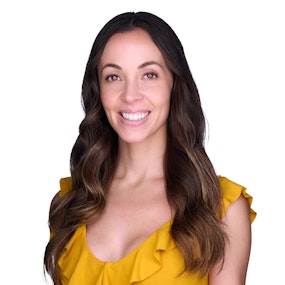
Rebecca Washuta
Licensed Dietitian
Rebecca is a Licensed Dietitian Nutritionist and Health Coach specializing in weight management and habit formation. With degrees in both Neuroscience and Nutrition, Rebecca helps her clients determine the best foods for their bodies, and helps them develop lasting healthy habits so they can achieve their weight loss and wellness goals.









